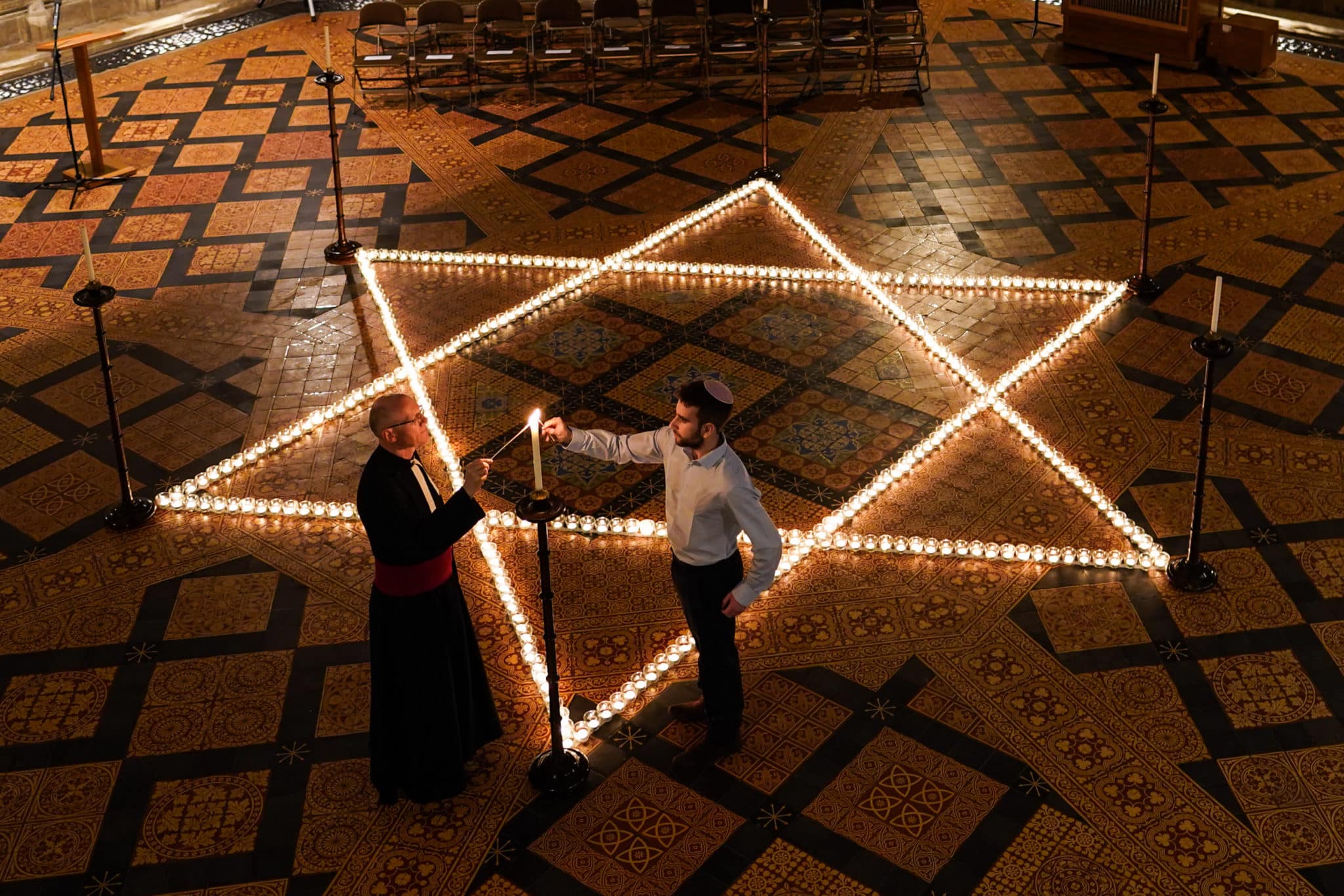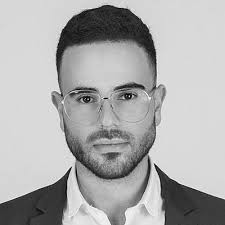 YORK, ENGLAND – JANUARY 23: The Reverend Canon Dr Christopher Collingwood (L), Canon Chancellor of York Minster and Joshua Daniels from University of York Jewish Society light some of the 600 candles shaped as a Star of David on the floor of the Chapter House of York Minster as part of a commemoration for Holocaust Memorial Day on January 23, 2020 in York, England. (Photo by Ian Forsyth/Getty Images)
YORK, ENGLAND – JANUARY 23: The Reverend Canon Dr Christopher Collingwood (L), Canon Chancellor of York Minster and Joshua Daniels from University of York Jewish Society light some of the 600 candles shaped as a Star of David on the floor of the Chapter House of York Minster as part of a commemoration for Holocaust Memorial Day on January 23, 2020 in York, England. (Photo by Ian Forsyth/Getty Images) Every year, a group of a few dozen mostly older Jewish people comes together around June to hold a ceremony. No Israeli politician ever finds time to join them. Perhaps they are busy. Still, it is strange that out of a 120 members of parliament, not one finds this gathering important enough.
Every year, one survivor will get up to the microphone and speak. A heavy Iraqi accent will make it difficult to understand what he or she is saying. Like clockwork, the speaker will start tearing up as they share the horrors they have endured, likely when they were just a teenager. In the burning sun of the peripheral town of Or Yehuda, Israel, they will read a prayer for those who did not survive, conclude the ceremony, and walk back to their homes.
On the walls of the small Heritage Center for Babylonian Jewry, where this ceremony takes place, there’s one testimony from 1941. It is old, and a few of the letters are missing. It reads:
The door suddenly broke open.
My mother stood by the door and I stood behind her …
Our neighbors ente[r]d, and so did other Arabs …
My mother said to them (in Arabic):
“The house and everything in it is yours. Just don’t hurt us.”
They started taking out objects one after the other.
In the midst of the looting, a policeman in uniform entered …
He stood there and cursed our religion and
Palestine (in Arabic). Mother kept begging …
He shot her in the head and she fell.
I fled and stood behind the policeman.
My olde[r] sister ran towards her: “Mother, mother!”
(A rioter was standing on the roof) he took hold of my younger brother and wanted to slaughter him …
My (other) sister begged:
“Child, child, why are you killing him?”
My cousin wanted to go upstairs. The rioter opened her belly
and everything fell out.
The reason that this ceremony – unlike many of the other ceremonies for victims of anti-Semitic violence – does not get any serious recognition, even in Israel, is that it memorializes the invisible: the Mizrahi community, the Jews of the Middle East and North Africa.
This ceremony commemorates the two days of violence that the Jewish community in Iraq faced in June 1941, known as the “Farhud” (in Arabic: violent dispossession) and the public hangings of Jews in Iraq in the 1960s and ’70s.
During these massacres, Iraqis killed hundreds of Jews and tens of thousands were injured. But our story – my grandmother’s story – was never told.
But the truth is, that while I know the history of pain my Ashkenazi friends’ grandparents endured, they don’t know mine.
For this year’s ceremony, the group invited me to speak. When they introduced me, they referred to me as a grandchild of a survivor. Being “grandchild of a survivor” is a title many of my friends in Israel have − all of them Ashkenazi Jews whose grandparents survived the Holocaust. However, I’ve never been included in that group. It didn’t matter that my relatives, too, had survived the Nazis. My Tunisian father’s grandparents were sent to a forced labor camp of the Vichy regime during the Holocaust. They were due to be shipped to death camps in Europe. My Iraqi grandparents also were victimized by the Third Reich; they survived the Farhud, which was incited by Nazi supporters in the regime.
But the truth is, that while I know the history of pain my Ashkenazi friends’ grandparents endured, they don’t know mine. While I know the names of the death camps and the horrific violence that happened to the Jews in Europe, my friends don’t even know what the Farhud was.
It breaks my heart. It should break every Jewish person’s heart.
I am not sure if there’s an intentional agenda behind erasing the Mizrahi Jewish community’s history from international academia and public discourse. Our exclusion does not feel deliberate on most days. But when we point out our absence from the conversation and are shamed as “divisive,” it’s hard not to see this erasure as an act of malice. As a grandson of a survivor, I have a responsibility to keep trying to get the world to bear witness, just as I have to the many Ashkenazi Jews who were slaughtered in the Holocaust.
Every Mizrahi Jew feels personally responsible for building the memorials that are never financed, writing eulogies that are never published, and bearing witness for our dead the world does not want to see.
Hen Mazzig is an Israeli writer, speaker and activist and a senior fellow at the Tel Aviv Institute. Follow him: @HenMazzig






















 More news and opinions than at a Shabbat dinner, right in your inbox.
More news and opinions than at a Shabbat dinner, right in your inbox.